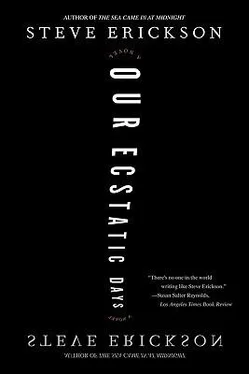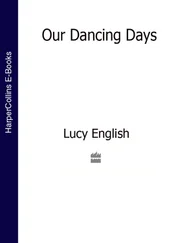Overwhelmed by the menstrual vortex of water and fog, rocked by the red wind trying to rip her from the billboard where she clings to the flimsy rail of the walkway, she suddenly flashes back on the moment five years ago when she reached the hole at the lake’s bottom, with the silver gondola above her head where Kirk was being kidnapped by an owl. She remembers that she was already wondering how she was going to get back up to the surface before her lungs burst; she was trying not to panic. She could feel the pull of a riptide and the push of a current, the hole drawing her in and turning her back, and even now she’s not really certain whether going into the hole was her idea or its idea; but she distinctly remembers the loss of control and that then she did panic: the opening didn’t seem nearly big enough. But she slipped through suddenly in a dilated rush, and on the other side she was … she was … back in the lake. She had swum down into the hole and, on the other side, found herself coming back up out of the hole, swimming up toward the gondola.
At the time, and all the time since, she thought she must have just gotten confused. She assumed she just got turned around, what with currents and tides coming and going. But now up here on top of Justine, hanging on to the rail in this red wind, with her blood splattered across the sky, she suddenly knows something she didn’t until now: that she wasn’t confused. That she wasn’t turned around. That she was pulled through the opening from one lake into another just like it, just like it in every way, every way except one, and that one difference was that on this other lake, there was another silver gondola just like on the first lake — except that this was a gondola without her son.
In the thrall of the wind and the red sky, there at the top of the billboard she feels hysteria lapping at her mind, first a small swell then rocking her harder and harder: suddenly she understands that the vision of the boy and the owls given to her by the lake has led her here to this vantage point at this place in this moment beneath this sky so that, beneath the red heavens above, she could have this revelation of another lake and, on it, her son, still waiting there even now. Understanding this with more clarity than she’s ever understood anything, she feels the coming hysteria and an irresistible urgency to get off the billboard; but when she moves to climb down, the red wind threatens to blow her off, and finally all she can do is lie flat and wait. Lying flat on her back, she slips off her red dress and ties herself to the rail with it, although this is more instinctive than any kind of cool collected action: she’s in a trance because, lying there flat on her back staring up at the sky and the wind, all she can think is that back through that hole at the bottom of the lake, back on the other side of that opening, on the Other Lake she left behind five years ago, her wildman is still there sitting in the gondola looking around, still trying to be brave, still waiting for his mother to come back. He’s been waiting what’s been five years on this side of the hole, on this lake, although who knows how long it’s been on his side, five minutes or five seconds; but he sits there now waiting as it gets darker and darker, calling “Mama?” and gazing over the gondola’s side. The more Lulu thinks about this up there on top of the billboard, the more she knows it to be true. Lying there in the wind beneath the endometrial sky, hysteria finally begins to recede. But the realization of what happened five years ago doesn’t recede with it.
That night the red storm blowsacross the lake while she stands on her front porch staring east to where she left her son in the gondola five years ago, promising she would be right back. She waits for the storm to pass but it blows all night and, watching, she lashes herself to the porch with sheets from her bed as she lashed herself to Justine that afternoon with her dress; she can’t bear to abandon him again. She’s torn between two sons, the one she’s seen flying with the owls and the one down beyond the uterus of the lake on the other side, in the gondola still waiting for her.
In the morning she wakes chilled and soaked, still bound to the porch and having slept through the rain in a blizzard of dreams, she who used to never dream. She can’t be certain whether the fever that wracks her is the fever of dreams or the fever of rains, and she finally undoes all the wet saturated knots of the sheets to stumble into the house and fall on the bed. The last time she was this cold was the night five years ago she lowered herself from the gondola into the lake; and as she takes off all her wet clothes and wraps her nude body in several blankets and sleeps again, in her sleep she sees him, still waiting for her in the gondola, calling to her
Mama?
and she wakes to a bed drenched in fever. She smells the dreams like wet ash on the mattress. She sniffs the mattress up and down from the foot of the bed to the head and sometimes catches a whiff of the lake at the juncture where the fresh water meets the sea, sometimes a whiff of the wet wood of oars, and there at the mattress’northeastern quadrant is the smell of him. It’s there. She had forgotten how he smelled but now, this afternoon, in the sweat of her dreams she remembers, because the wet stain of memory is there on the mattress. The mattress has become a map of her dreams and their remorse, longing, rage, desolation. For the rest of the afternoon she lies naked on the bed with her head in that one spot, one side of her face to the mattress so she can smell him, and when she falls asleep yet again, the smell of him is all she dreams. She wakes to a call
Mama?
and hears it so distinctly that for a moment she believes he’s there in the house. She believes he’s fallen asleep in his bed in another room and that he calls out to her like he used to back at the Hamblin. She sits up with a start in the dark and listens, but the call doesn’t come again until she falls back to sleep.
Her fever has passed but it’s exhausted her. She lays back down but every time she falls asleep on the map of dreams she wakes to his call, until even in her fatigue there’s nothing she can do but pull on some clothes, stumble out to the porch of the house, loosen the line of the gondola and get in slowly, wearily pushing herself with the pole east along the coastline of the Hollywood Hills to that place on the lake she last went five years ago. Although it’s not much more than a mile from where she lives, she’s avoided this part of the lake all these years and dreads it now.
The shoreline has changed a little since then, the lake having risen farther down what was once the Strip, now submerged. Rowing along the Hollywood cliffs she sees newly abandoned patches of the hills, empty houses and what were once chic little lanes that now disappear into water. Several members of a tribe of nomads, identifiable by their lack of either blue attire or Lulu’s subversive red, run alongside the water following the gondola for a while before they give up and turn back. Around a bend in the coast she sees the spires of the old Chateau X hotel; as dusk falls she can see lit candles darting in the castle’s top windows. From the top of the hill above the Chateau the sky tram erected just a few years ago launches itself out over the water, the Nichols Canyon Line that runs to the Fairfax station in the east and then to the Old Cahuenga station beyond; plunging south into the lake in the distance is the Port Justine Line that was begun but never finished. Not far from the coast there still bobs on the lake’s surface the remnants of the sky tram shuttle that plummeted into the water ten months ago when the line broke, drowning nine people including two children. Forty-five minutes later the terrain becomes familiar to her in the twilight, minus the empty fair tents she so distinctly remembers as blowing on the Laurel Canyon beaches that evening that now seems like it was just a month ago, a week, an hour.
Читать дальше











